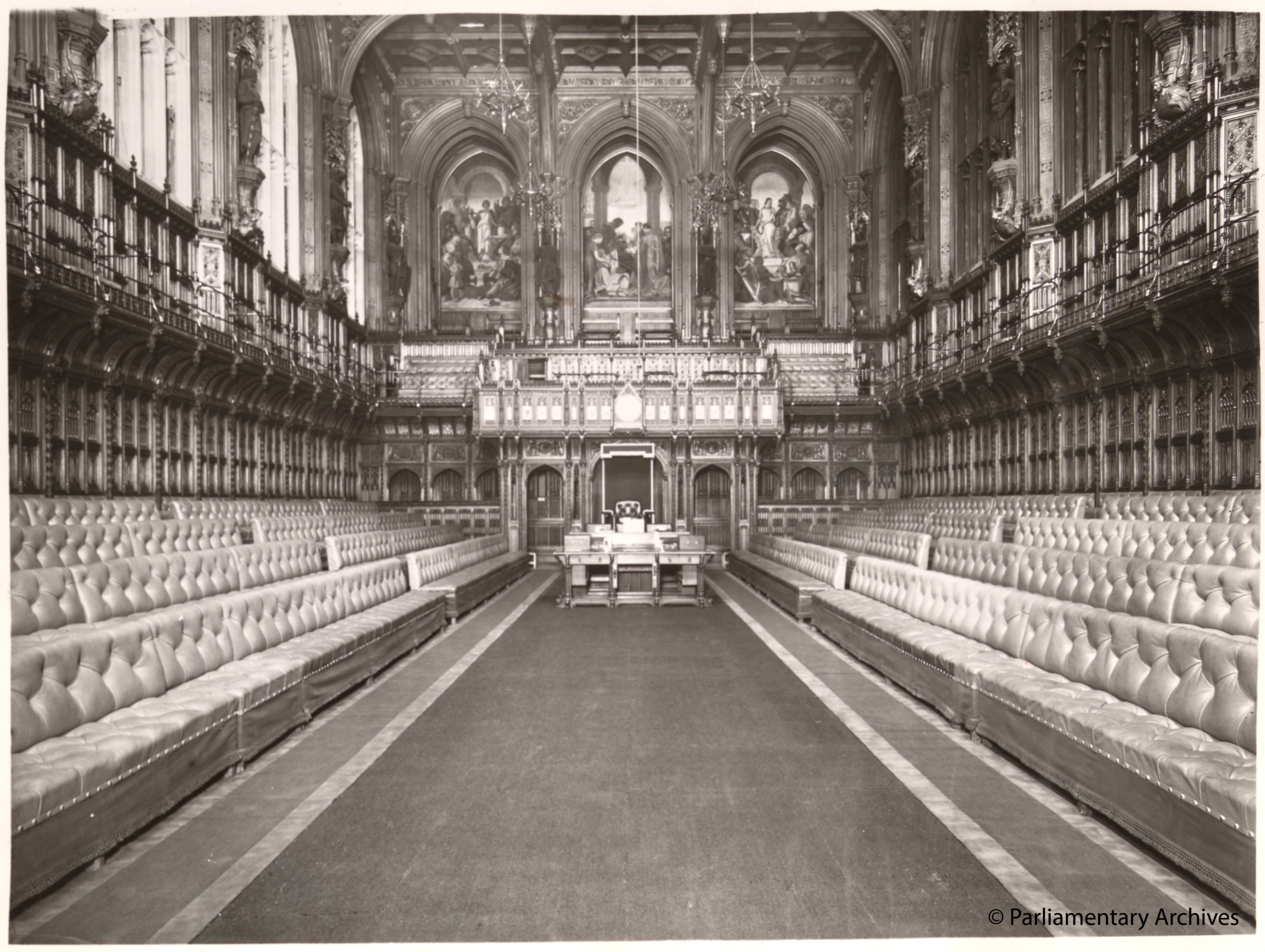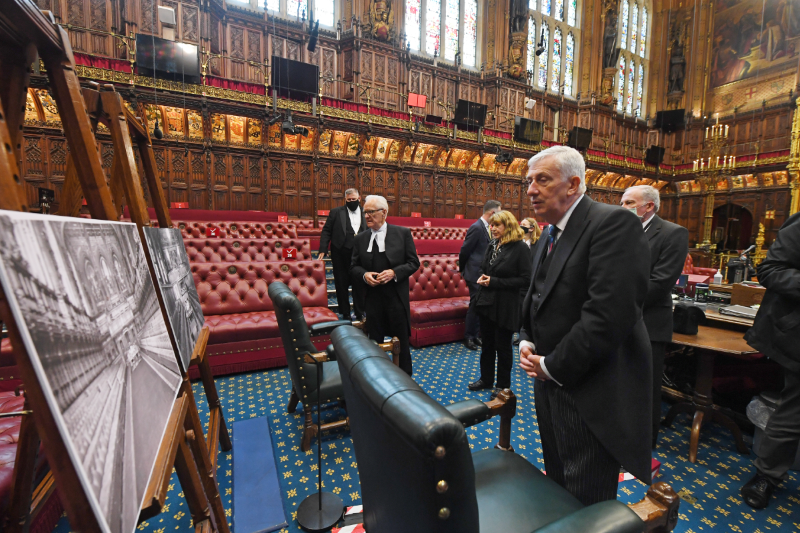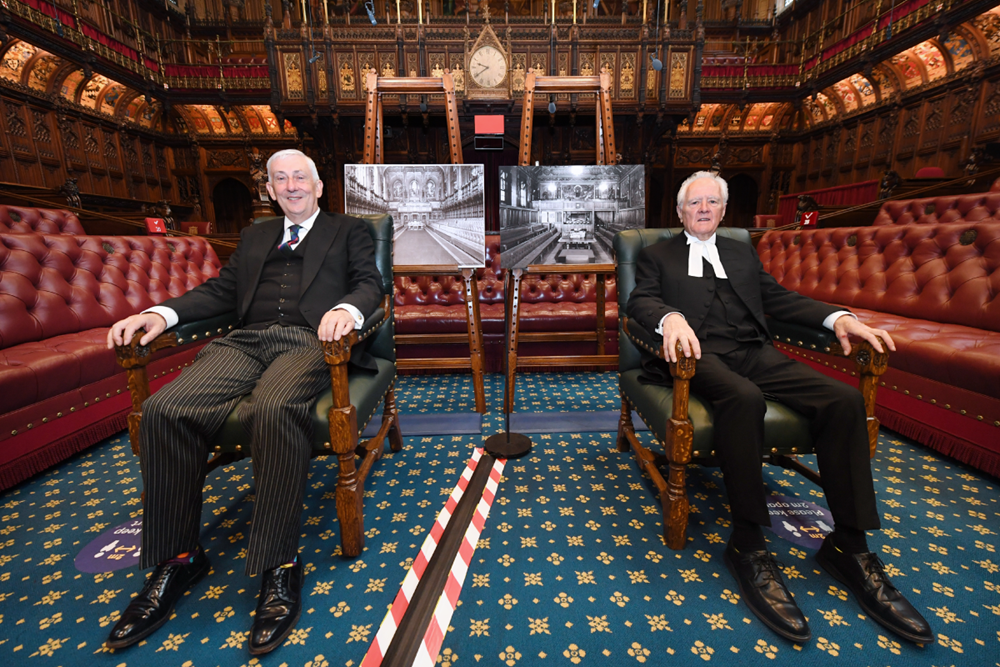Parliament’s two Speakers mark secret plan for MPs to meet in the Lords
24 June 2021
A wartime undercover operation which saw MPs meeting secretly in the House of Lords 80 years ago, was marked on Tuesday 22 June by the Speakers of both Houses of Parliament, ahead of the anniversary today, Thursday 24 June 2021.
The House of Commons Chamber was completely destroyed during the largest air raid on London on 10/11 May 1941, leaving Members of Parliament without a Chamber in which to debate.
Following a suggestion by the radical Independent Labour MP James Maxton that MPs should take over the second chamber, the Lords agreed to relocate – a move that was readily agreed to by King George VI.

Initially, Prime Minister Winston Churchill had reservations about the plan, but soon warmed to the idea, commenting: ‘I never thought to make speeches from those red benches, but I daresay I shall take to it all right.’
MPs eventually moved into the slightly larger and more spacious House of Lords Chamber on 24 June, 1941 - and stayed there for nine years until 26 October 1950 - while the Lords decamped to the Robing Room.
It was there that some of Churchill’s celebrated speeches to the House were delivered, and from there too the Labour government of Clement Attlee drove through its innovative and radical post-war reconstruction programme.
Speakers of both Houses met on Tuesday 22 June to mark anniversary
To commemorate this little-known part of Second World War history, the Speakers of both Houses of Parliament discussed the anniversary with Parliamentary Historian Dr Elizabeth Hallam-Smith on the floor of the Lords - and recreated the look of the Chamber with the temporary Speaker’s chair that was discovered in the Commons Library.
Sir Lindsay Hoyle, Speaker of the House of Commons, said: ‘We may be two Houses of Parliament, but in times of crisis – be it facing the Covid pandemic, or when the Commons Chamber was destroyed during the Second World War - we work as one to overcome adversity.
"It is important that we mark this historic event when - under the radar of the Luftwaffe - MPs met secretly in the larger House of Lords Chamber for nine years to make sure democracy continued.
"It would have been strange sitting on the red benches, rather than the green; meeting in the dim light caused by the blackout blinds, and straining to hear other Members in the echoing space.
"But it enabled us to continue passing essential laws, including the post-war creation of one of the national services we have needed more than ever in recent times - the NHS - so we should be forever grateful for this agreement between the two Houses."
Lord McFall of Alcluith, the Lord Speaker, said: "My House of Lords colleagues are known for their courtesy, kindness and ability to rise to the occasion in a crisis. Their response to the coronavirus crisis is testament to that.
"This was clearly true 80 years ago in the events following the bombing of the House of Commons chamber, when Members of the House of Lords at that time readily offered the use of their chamber to MPs while the House of Lords took up residence in the Robing Room. Which apparently they very much enjoyed."
"What a lot of people might not know about Parliament is the extent to which we work together as two Houses. Our job is to be a critical friend to the Commons, using our experience to improve draft laws - often with some back and forth - until they are in the best shape."
In 1941, MPs’ new home in the Lords was rearranged
In 1941, the MPs’ new home in the Lords was rearranged, with the Speaker’s Chair and the Clerks’ table situated at the north end of the Chamber, beneath the Press Gallery and where the bar of the House is now.
The throne was curtained over, the woolsack removed, and extra seating was added to accommodate about 400 MPs, out of the then contingent of 615. Extra time was allowed for divisions because the Lords’ voting lobbies were very narrow compared to the layout in the Commons.
The Speaker’s procession was even diverted through Central Lobby and Peers’ Lobby to reach the Lords - part of a route that is retained today.

Dr Elizabeth Hallam-Smith said: "Although the MPs were very grateful to the Lords, there were numerous complaints about poor acoustics, dingy lighting caused by blackout blinds, inadequate heating and erratic ventilation.
"Some of the experimental measures taken to combat these problems influenced the design of the new Commons Chamber."
But Dr Hallam-Smith said peers enjoyed their time in the Robing Room, which is principally used by the Sovereign for the State Opening of Parliament.
"The compact chamber, which seated up to 96 members, was an ideal match for the numbers who normally attended the House," she said.
"Infact, parliamentarians and the Press thought that the quality, authority and significance of debates improved markedly in the new abode, and that the House was “reborn as a deliberative assembly”.
Image credit: UK Parliament/Jessica Taylor
